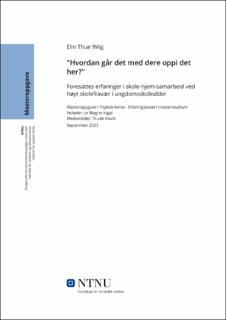| dc.description.abstract | Sammendrag
Målet med denne kvalitative studien har vært å undersøke foresattes erfaringer i skole-hjem-samarbeid ved høyt skolefravær i ungdomsskolealder. Det er utført semistrukturerte intervju med fem mødre. Ifølge informantene er følgende faktorer viktig for samarbeidet: Å etablere samarbeidet tidlig, tett kommunikasjon, felles situasjonsforståelse og at skolen har høy kunnskap om fraværsproblematikk. Skolen bør heller ikke legger ansvaret for skolefraværet på barnet eller foreldrene alene, og utnytte kunnskapen til de foresatte bedre. Skolen bør anerkjenne at situasjonen oppleves krevende for de foresatte.
Påkobling av eksterne hjelpere i skole- hjem-samarbeidet har ifølge informantene ulik effekt. Når foresatte og hjelpeapparatet har en felles forståelse av utfordringen, kan det eksterne hjelpeapparatet bidra til å justere skolens situasjonsforståelse. Når den felles forståelsen mangler kan skole- hjem- samarbeidet forverres, siden foreldrene opplever at skolen lytter mer til det eksterne hjelpeapparatet enn til dem.
Studien viser at høyt skolefravær over tid kan oppleves belastende for foreldrene. Man kan føle seg alene om å skulle håndtere barnets utfordringer, og kjenne på skam knyttet til å ikke mestre det andre foreldre får til. Sykmelding eller søknad om pleiepenger kan være en konsekvens.
Pandemien har først og fremst påvirket barnas skolefungering, ikke skole-hjem samarbeidet. Noen ser tilbake på pandemien som en kjærkommen pause fra forventningen om å få barnet på skolen. Andre mener at restriksjonene under pandemien var en utløsende faktor for skolefraværet.
Til slutt ønsker mange mer forståelse og omsorg fra skolen. Flere uttrykker at skolen i større grad bør tåle sterke emosjonelle uttrykk fra foresatte som følge av opplevelsen av avmakt.
Nøkkelord: Skole-hjem-samarbeid; høyt skolefravær; foreldreperspektiv; andre hjelpere; tett kommunikasjon; felles forståelse; pandemi; anerkjennelse; omsorg; belastning | |
| dc.description.abstract | Summary
The aim of this qualitative study has been to examine parents’ experiences of the cooperation between the school and the home when pupils in lower secondary school have high absence rates. Semi-structured interviews were conducted with five mothers. According to the informants, the following factors are important for achieving positive cooperation: establishing the cooperation at an early stage, having close communication, reaching a common understanding of the situation, and the school needing to have in-depth knowledge on the problem of absenteeism in school. Moreover, the school should not make the child or the parents solely responsible for the absence, and should also make better use of what the parents know about the situation. The school should also acknowledge that parents find the situation demanding.
According to the informants, bringing external services into the school-home cooperation has varying effects. When parents and the assistance services have a common understanding of the challenge, the external assistance may contribute to the school adjusting its understanding of the situation. When there is no common understanding, the cooperation between the school and the home may deteriorate as the parents find that the school listens more to the external services than to them.
The study shows that a high rate of school absenteeism over time can be experienced as a burden by the parents. They may feel they are alone in dealing with their child’s challenges and may feel shame over not being unable to master what other parents manage. Sickness leave from work or applying for assistance benefits may be one consequence of this.
The recent pandemic has first and foremost affected how children function in school and not the school-home cooperation. Some of the informants look back at the pandemic as a welcome break from the expectation of having to get their child to go to school. Others believe that the restrictions during the pandemic were factors that triggered the school absenteeism.
In conclusion, many of the informants would like to see more understanding from and care practised by the school. Several of the informants state that school should tolerate strong emotional expressions from the parents as they feel powerless in the situation.
Keywords: School-home cooperation, high school absenteeism, parental perspective, other assistance services, close communication, common understanding, pandemic, acknowledgement, care, burden | |
